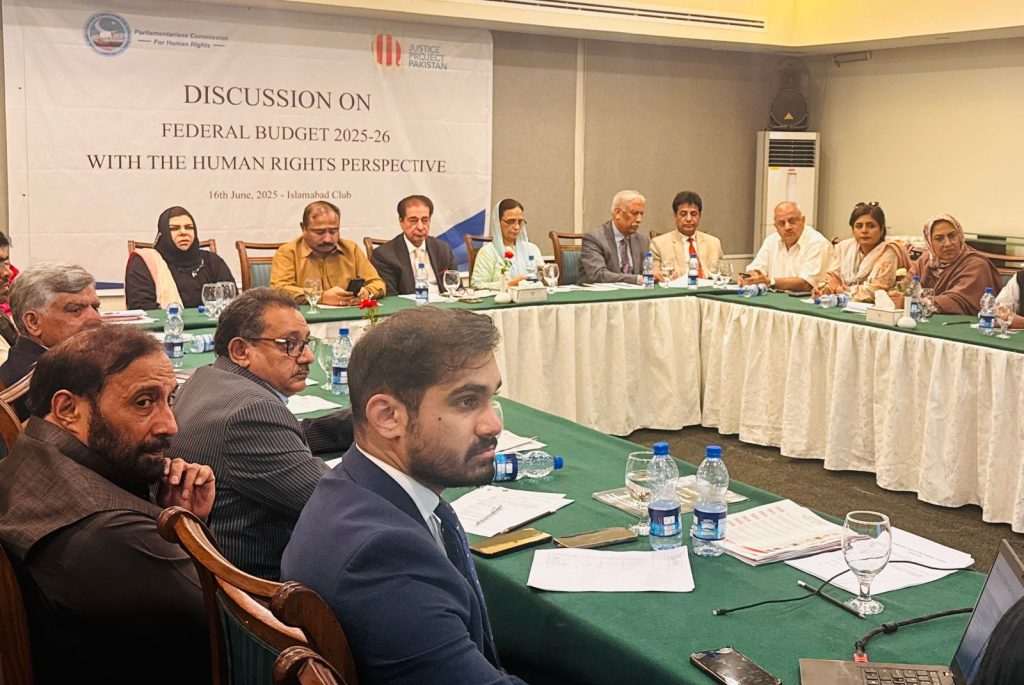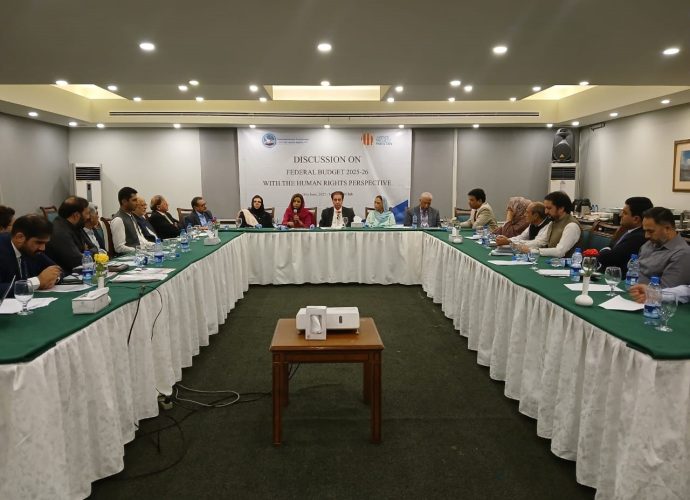ISLAMABAD STAFF REPORTER
The Parliamentarians Commission for Human Rights (PCHR) convened a high-level consultation to discuss Federal Budget 2025–26 with a Human Rights Perspective. Parliamentarians belonging to all political parties participated in the event. Speakers included Dr. Nafisa Shah (Chairperson, Gender Mainstreaming & Law and Justice Committee, National Assembly), Ms. Shahida Rehmani (MNA, Chairperson, Women’s Parliamentary Caucus), Senator Khalil Tahir (Member, Standing Committee on Human Rights, Senate of Pakistan), Mr. Riaz Fatyana (MNA), Mr. Ahmad Saleem Siddiqui (MNA), Ms. Asia Ishaque Siddiqui (MNA), Mr. Nelson Azeem (MNA), Mr. Naveed Amir (MNA), Ms. Sehar Kamran (MNA), Mr. Isphanyar Bhandara (MNA), Mr. Amjad Ali Khan (MNA), Syed Hafiz Uddin (MNA), and Mr. Miqdad Ali Khan (MNA).
In addition to the parliamentarians, several civil society experts and representatives of key government departments also attended the consultation. Renowned journalists, including Mr. Afzal Butt, President of the Pakistan Federal Union of Journalists (PFUJ), and Mr. Nayyar Ali, Secretary of the National Press Club, also participated and emphasized the role of the media in promoting transparency, accountability, and human rights-centered policy discourse.

Mr. Mohammad Riaz Fatyana, MNA & Chairman of PCHR, introduced the mission and contributions of PCHR and emphasized the importance of rights-based parliamentary scrutiny of the national budget, particularly in relation to marginalized groups and underrepresented sectors. Mr. Muhammad Shafique Chaudhry, Executive Director of PCHR, gave a presentation on Pakistan’s international human rights obligations and highlighted the need for adequate resource allocation to ensure the effective implementation of human rights laws and policies in Pakistan. He also suggested the formation of two parliamentary working groups on the prevention of torture and protection of minority rights.
Ms. Michelle Shahid from the Justice Project Pakistan, the partner organization of PCHR, presented a detailed analysis of Pakistan’s anti-torture legal and policy framework, identifying critical gaps that require urgent legislative and administrative attention.
Dr. Shafqat Munir Ahmad, Deputy Executive Director (Policy) and Head of the Sustainability and Resilience Programme, presented an in-depth analysis of Pakistan’s Budget 2025-26 through a Human Rights Lens. He assessed the current budget’s alignment with human development indicators, social protection, gender equality, and minority inclusion. He highlighted that the Federal Budget 2025–26, while setting ambitious goals such as 4.2% GDP growth and Rs 14.3 trillion in revenue, reveals glaring human rights gaps beneath its fiscal projections. Gender and minority rights remain largely unaddressed, with no targeted allocations or policy frameworks to protect vulnerable populations, reflecting silent gaps in inclusivity. Despite a digital levy projected to raise Rs 64 billion, the absence of investment in Right to Information and Digital Inclusion perpetuates exclusion, especially for rural and underserved communities. The budget offers a token relief to salaried workers but fails to address systemic unemployment and informality, undermining the Right to Work and Economic Justice, particularly for women, youth, and low-income groups. Meanwhile, cuts to 118 development projects and inadequate funding in health and education—sectors already crippled by poor access and quality—underscore the neglect of the Right to Education and Health. The budget sidelines the essential human development priorities, reinforcing structural inequalities instead of remedying them.
In her remarks, Dr. Nafisa Shah (Chairperson, Gender Mainstreaming & Law and Justice Committee, National Assembly) underscored that the National Assembly’s Finance Committee is actively reviewing the budget, presenting a timely opportunity for legislators to advocate for increased allocations toward sectors that directly impact human rights, particularly for vulnerable and underserved populations.
Participants showed their concern over the excessive and arbitrary powers granted to the Federal Board of Revenue (FBR) in the proposed 2025–26 federal budget, particularly the authority to arrest individuals and seize property without judicial oversight. They emphasized that such measures undermine the principles of due process of law and could be misused for politically motivated actions rather than genuine tax enforcement. They suggested the government should focus on raising awareness and encouraging voluntary tax compliance instead of using institutions for politically motivated purposes. Participants also collectively emphasized the need for a multi-stakeholder approach to embed human rights priorities into Pakistan’s fiscal policies and national development agenda.


